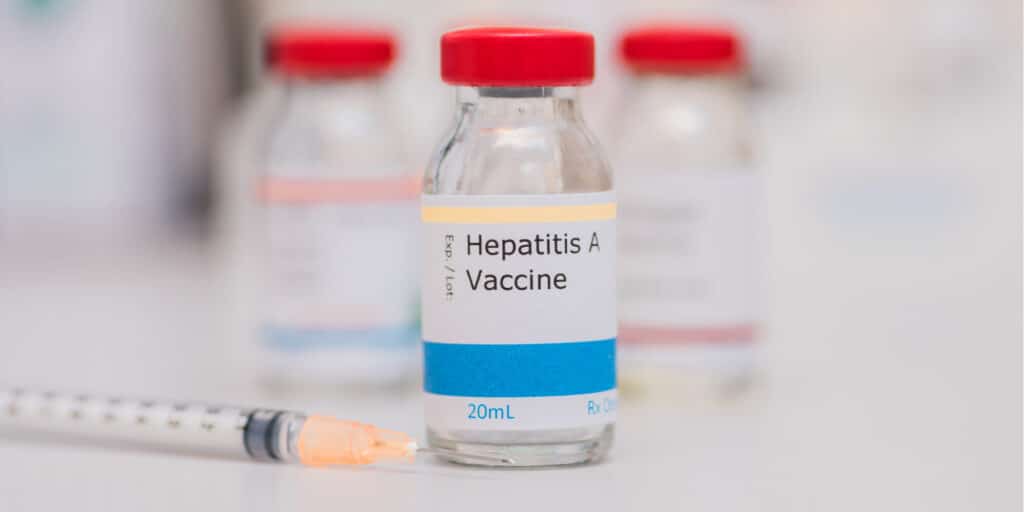When we think of vaccine-preventable outbreaks, it’s no surprise that many of us think about the current COVID-19 pandemic. However, several other conditions and outbreaks can be easily prevented by vaccinations. One of those vaccines is the hepatitis A vaccine. It’s common to think about contaminated food and water as a common mode of transmission for hepatitis A, however, in the United States, it is more commonly spread from person to person. Before delving into the hepatitis A vaccine, let’s first take a look at what the virus is, and what an infection looks like.
What Is Hepatitis A?
Hepatitis A is a serious, highly contagious liver infection caused by the hepatitis A virus. It is one of several types of hepatitis viruses that cause inflammation and affect your liver’s ability to function properly.
Hepatitis A is most commonly spread through contaminated food or water, although in recent years it has begun to spread more rapidly through close, personal contact with an infected person. While more mild cases of hepatitis A do not require treatment, although in rare cases it can cause liver failure and death. For the most part, most people who get hepatitis A feel sick for several weeks, but they usually recover completely and do not have lasting liver damage.
Practicing good hygiene, including washing hands frequently, is one of the best ways to protect against hepatitis A. However, vaccines are the most effective way for preventing both infection and future outbreaks and are widely available for people most at risk.
Hepatitis A Statistics

Since the last substantial increase in outbreaks of hepatitis A in 2016, 37 states have publicly reported a total of 43,722 cases, 26,665 hospitalizations, and 420 deaths as of February 11, 2022. Beginning in March of 2017, the U.S. Centers for Disease Control and Prevention’s Division of Viral Hepatitis (DVH) has been assisting multiple state and local health departments with hepatitis A outbreaks, spread through person-to-person contact.
Of the states that have reported significant outbreaks of hepatitis A, Florida and Kentucky have reported the most cases, with 5,103 and 5,081 respectively. Ohio, Tennessee, and Indiana have also reported significant outbreaks of hepatitis A, with 3,763, 3,167, and 2,660 cases respectively.
Symptoms of Hepatitis A Infection
Typically, hepatitis A signs and symptoms won’t appear until you’ve had the virus for a few weeks. However, not everyone who contracts hepatitis A will develop symptoms (also known as asymptomatic infection). If you do develop an infection, symptoms of hepatitis A include:
- Fatigue
- Loss of appetite
- Low-grade fever
- Clay-colored bowel movements
- Dark urine
- Joint pain
- Sudden nausea and vomiting
- Abdominal pain or discomfort, especially around the upper right side (by your liver)
- Yellowing of the skin (jaundice)
- Intense itching or burning sensations
As previously mentioned, most people who contract hepatitis A will have relatively mild symptoms, which typically subside within a few weeks. Sometimes, however, hepatitis A can cause severe illness, liver failure, or death in extreme cases.
Because hepatitis A causes inflammation of the liver, people with other forms of viral hepatitis and anyone with underlying liver disease are at risk of more severe illness if infected.
Who Is at Risk for Hepatitis A Infection?
Hepatitis A can affect anyone, at any time, regardless of age, sex, race, or other factors. That said, there are several groups of people that the CDC says are at the highest risk for both becoming infected with, and developing serious complications from hepatitis A. The CDC strongly recommends that people in these groups, as well as the rest of the population, get vaccinated against hepatitis A to help prevent or control future outbreaks.
The following groups are at higher risk:
- People who use drugs (injection or non-injection)
- People experiencing unstable housing or homelessness
- Men who have sex with men (MSM)
- People who are currently or were recently incarcerated
People with chronic liver disease, including cirrhosis, hepatitis B, or hepatitis C
If you are in one of the above-mentioned at-risk groups, or if you have not yet been vaccinated against hepatitis A, talk to your about scheduling an appointment to get vaccinated. Like many other vaccine-preventable outbreaks, hepatitis A can be easily prevented, and getting vaccinated can help stop future outbreaks.
Why the Hepatitis A Vaccine Is Important


The best way to prevent hepatitis A infection is by getting vaccinated. The vaccine provides long-term prevention of hepatitis A infection. It also is available for anyone 12 months and older, followed by a second dose at least six months later.
Currently, there are two types of hepatitis A vaccines available in the U.S. The first is a vaccine known as a formaldehyde-inactivated vaccine. This hepatitis A vaccine is used in most countries around the world and is available in pediatric doses for children between the ages of 1 and 15 years of age. Inactivated vaccines use the killed version of the germ that causes a disease. Inactivated vaccines usually don’t provide immunity (protection) that’s as strong as live vaccines, which is why a booster vaccine is recommended six months after your initial dose.
The other hepatitis A vaccine is known as a live attenuated vaccine. These vaccines are manufactured in and mainly used in China. They have also been used sporadically in the private sector in India. This type of vaccine uses a weakened (or attenuated) form of the germ that causes a disease. Because these vaccines are so similar to natural infections that they help prevent, they create a strong and long-lasting immune response.
It is recommended that everyone get the hepatitis A vaccine, especially young children. The hepatitis A vaccine not only protects children from infection but also can help prevent future outbreaks. Childcare centers are a common site of hepatitis A outbreaks. Some kids can be infected and not have symptoms, but they can still spread the virus to others. Having many young kids vaccinated against hepatitis A can stop it from spreading in a community.
As with any vaccine, including the hepatitis A vaccine, there are risks associated with inoculation. If you have any concerns about vaccination, or if you’d like to learn more about hepatitis A, talk to your doctor about the risks and benefits of getting vaccinated.
Are You Familiar With the Hepatitis A Vaccine?
Let us know your thoughts and experiences in the comments section below!
What topics related to hepatitis A or vaccine-preventable infections should we cover next?
Email us your ideas at info@painresource.com
Want even more Pain Resource content?
Join the discussion today by clicking here to become a member of our brand new online community!




